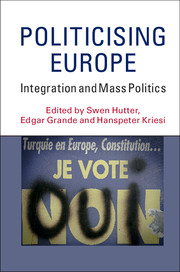Book contents
- Frontmatter
- Contents
- List of figures
- List of tables
- List of contributors
- Preface and acknowledgements
- Part I Theory and methods
- Part II Mapping the politicisation of European integration
- Part III Driving forces and consequences of politicisation
- Part IV Conclusions
- Methodological Appendix: measuring politicisation, benchmarks and data
- Bibliography
- Index
Preface and acknowledgements
Published online by Cambridge University Press: 05 March 2016
- Frontmatter
- Contents
- List of figures
- List of tables
- List of contributors
- Preface and acknowledgements
- Part I Theory and methods
- Part II Mapping the politicisation of European integration
- Part III Driving forces and consequences of politicisation
- Part IV Conclusions
- Methodological Appendix: measuring politicisation, benchmarks and data
- Bibliography
- Index
Summary
Politicising Europe is the third major volume from a long-term research collaboration between Edgar Grande and Hanspeter Kriesi that started in the early 2000s. It builds on previous work on the political consequences of globalisation and the re-structuring of political conflict in western Europe and takes a closer look at the development of political conflict over European integration. This book is once more based on a large-scale empirical research project that covers six west European countries, several political arenas and more than four decades from the early 1970s to a peak of the euro crisis in 2012. Our shift in emphasis to European integration issues is both for analytical and political reasons. On the one hand, our previous projects have shown that conflicts over European integration have been constitutive for the emergence of a new ‘demarcation-integration’ cleavage in western Europe. Therefore, examining these conflicts in more detail promised important new insights into the political mechanisms that drive the transformation of political conflict. On the other hand, political developments since the mid 2000s have given the impression that the European integration process has been entering a profound political crisis. This became most evident in the rejection of the Constitutional Treaty in two national referendums in France and the Netherlands in 2005 and the following fruitless debates on the future of the ‘European project’. After two decades of intensified integration, which commenced in the mid 1980s with the project to complete the single market and came to an end in the mid 2000s with the accession of twelve new member states, there have been increasing signs that the political foundations of the integration process have been changing fundamentally. The current ‘euro crisis’ has intensified this political predicament even further. In 2015, it seems as if integration euphoria has given way to perennial frustrations, public support has turned into open political resistance and intensified political conflicts have been shaping decision-making on European issues both in supranational institutions and within the European Union's (EU) member states. Against this background, our study assumes that a focus on the politicisation of Europe, both as an analytical concept and as a political strategy, is key to an understanding of the acute problems that the European integration project faces today.
- Type
- Chapter
- Information
- Politicising EuropeIntegration and Mass Politics, pp. xv - xviiiPublisher: Cambridge University PressPrint publication year: 2016

